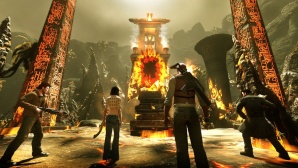The Secret World devs on keeping subscription fees
Funcom sees value in the business model for consumers and developers

The Secret World has been called the last of the subscription-based MMORPGs. The game severely underperformed after its July release, defying the hopeful expectations of developer Funcom, and sold only 200,000 copies as of the end of August. Several Funcom employees spoke with Eurogamer in a post-mortem, touching in part on the future of TSW and how monthly fees can still be useful.
"Subscriptions are always a challenge — I know that as a player," said Ragnar Tornquist, TSW's creative director. "If I'm asked to pay a subscription I'll think twice and three times rather than just doing an impulse purchase … But at the same time, we do have subscribers, and those people are getting a lot of good content with their subscription, and they don't have to worry about having to micro-pay for everything."
Tornquist said the game was made to work on a subscription model, but it could also function as a free-to-play game. If it made the transition, it would follow in the footsteps of other MMOs such as Star Wars: The Old Republic, Star Trek Online, and Funcom's own Age of Conan.
"You can speculate on whether we would have sold more copies [if we started free-to-play], but then how many more would we have needed to sell?" said TSW game director Joel Bylos. The team was quick to point out Funcom has no current plans to drop the monthly fees.
Tornquist said Guild Wars 2 allowed players to buy a full MMO for just the sticker price, altering the landscape for the genre. That could be hazardous for smaller studios such as Funcom; Tornquist said they cannot make that up-front investment without the sort of backing GW2 developer ArenaNet found in MMO giant NCsoft.
"It's really important to us with the business model we've chosen," Bylos said. "It sounds very emotional, but I almost feel like we need to prove that this business model has not gone the way of the dinosaur by delivering content constantly to people, and making people feel like there's value in it."
Weekly digests, tales from the communities you love, and more
I got a BA in journalism from Central Michigan University - though the best education I received there was from CM Life, its student-run newspaper. Long before that, I started pursuing my degree in video games by bugging my older brother to let me play Zelda on the Super Nintendo. I've previously been a news intern for GameSpot, a news writer for CVG, and now I'm a staff writer here at GamesRadar.



